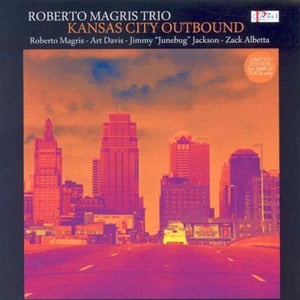$14.00
As musical relationships go, the one between pianist Roberto Magris and bassist-turned psychologist Art Davis was short, but intense and oh so sweet. They met in Los Angeles – Davis’ adopted home since 1986 – in October 2006, when Magris’ agent Paul Collins secured him a number of dates in the U.S. Davis – who continued to keep a full schedule as a bassist in addition to teaching and running a non-profit organization – joined the pianist’s quartet for two evenings at Catalina’s Jazz Club in Hollywood. They played a third time in a trio at the Jazz Bakery, and
wrapped up with a set of duets in Santa Monica, where Davis had a long-standing Sunday gig at the Ritz Carlton. “It all turned out very cool, onstage and offstage,” recalls Magris. “On one side I think that Dr. Art felt my awareness, respect and knowledge of the jazz tradition, and on the other side I felt that he really appreciated my pianism.” Magris returned to his home in Italy, but eight months later he reunited with the 72-year-old bassist in Kansas City, along with drummer Jimmy “Junebug” Jackson – the 21-year veteran of life on the road with B-3 master Jimmy Smith. Together, they played a tribute to the recently departed Jay McShann at the American Jazz Museum and reconvened the following day in the studio. The title track catches Magris in a John Coltrane state of mind, improvising with some dark, dense chords reminiscent of McCoy Tyner and drawing Davis back to his collaboration with Trane on Africa/Brass, Ascension, Olé! Coltrane and the alternate takes of A Love Supreme. With a muscular tone and unerring, majestic touch, Davis reminds us why he was the only bassist with an open invitation to jam with Trane’s classic quartet, and an ongoing favorite of Alice Coltrane’s after her husband’s death. Magris says he chose “I Fall In Love Too Easily” to take advantage of Davis’ “slow, rolling walk,” which is much in evidence here – stark contrast to the pianist’s angular phrasing and unexpected accents. The otherworldly introduction to “Iraqi Blues” seems to speak to lost souls, and Magris says: “There is no political statement behind the title except the aim to recall the memory of people who died there, no matter who was right and who was wrong.” A strong touch point in his conception was Stanley Cowell’s 1969 “Blues For The Viet Cong.” Billy Strayhorn’s gorgeous “A Flower Is A Lovesome Thing” was brought to mind by Davis’ recording of it with Herbie Hancock on the bassist’s 1995 recording A Time Remembered. Magris’ solo take on it is rendered stately and timeless by his extraordinarily precise fingering and light touch. The scene shifts to the next day – when the young Kansas City-based drummer Zack Albetta joined Magris and Davis – and, as before, Magris opens the session with an improvisation that he relates to the influence of Denny Zeitlin. When he recorded it on his 1978 Artists House album From California With Love Andrew Hill rendered his composition “Reverend Du Bop” as a meandering abstraction. Here, Magris tightens the focus while respecting Hill’s signature obtuse angles. Davis is extremely judicious in his note selection before switching to arco for one piquant chorus. “Rainbow Eyes” is dedicated to the pianist’s beloved, and again, Strayhorn’s influence is much in evidence. Strays for lovers? Always. Davis sets out the theme of Thelonious Monk’s “Bemsha Swing,” and the trio (with Jackson back on drums) bounces it between them – having so much fun, says Magris, that they almost forgot the arrangement they had worked out. “Lonely Woman” – Benny Carter’s, not Ornette Coleman’s – was a gift left to Magris by saxophonist Herb Geller after they recorded the 2003 Soul Note release Il Bello Del Jazz together. He plays it pretty here; edging toward a stride style with deliberate phrasing. Davis begins “Darn That Dream” with a distracted sounding solo – like a man waking from confusing sleep – and he continues to set up tension through the piece with accompaniment that slips out of phase with Magris’ lead. “Alone Together” is the sound of a band grooving hard. Davis is way up in the mix, setting a bustling pace and swinging effortlessly. “Bye Bye Baby” maintains the pace, with Magris striking an unusually bravura stance that finds him chewing up the changes like Oscar Peterson as he duets with Albetta. Peterson, Tyner, Cowell, Hill, Monk, Ellington… the roll call of great pianists present in spirit in Kansas City on these two days continues with one other who Davis felt Magris conjured the first time they met: “the Legendary Hassan.” Hassan Ibn Ali (born William Langford in 1931) is little more than a legend a couple of decades after his death. His recorded legacy is a mere single disc made with Davis and drummer Max Roach in 1964 and released under Roach’s name. A second recording with saxophonist Odean Pope was never released and the tapes are rumored to have been lost in a fire. But, like Robert Johnson, Hassan’s legacy can’t be contained by two shadowy recording sessions. A ubiquitous – albeit mysterious – figure on Philadelphia’s jazz scene in the ‘50s, Hassan is credited by Coltrane biographer Lewis Porter with opening the saxophonist’s ears to new harmonic possibilities. Jimmy Heath has said, “Hassan was Cecil Taylor before Cecil Taylor.” “’You play like Hassan,’ Dr. Art told me,” says Magris. “’Your sound and concept remind me of him.’ I’d never heard the name before. I’d completely missed him, even though I’d listened to most of the pianists from the history of jazz, and studied many of them, too. When I was a young musician I learned day by day, listening to LPs and checking out names and styles, including some of the most obscure and forgotten ones, but I’d never heard of Hassan. Dr. Art said that the session with Hassan was one of the best sessions he ever played.” Art Davis’ words carried authority, just like the man himself carried authority. His stand against discrimination at the New York Philharmonic shone a light on the continuing racism in U.S. symphonies, and his application of cello fingering to the double bass helped revolutionize the way the instrument was played. A giant figure, Davis died just three weeks after this, his last recording session. “I still keep the image of him standing in the studio in front of me,” says Magris. “I am very proud to have shared a stage with him and to have these recordings. I think that Hassan and Max Roach would enjoy them.”
James Hale
James Hale is a regular contributor to DownBeat and Signal To Noise, and the co-author of The Billboard Illustrated Encyclopedia of Jazz & Blues.
“Kansas City Outbound”
Roberto Magris Trio
Roberto Magris, piano
Art Davis, bass
Jimmy “Junebug” Jackson, drums on # 1, 2, 3, 8
Zack Albetta, drums on # 5, 6, 7, 10, 11
Recorded on July 2nd and 3rd, 2007 at Chapman Recording Studios, Kansas City, Missouri USA
Engineer, Justin Mantooth
Mixed and Mastered on September 28th, 29th and December 18, 2007 at Wizard Studios, Milan, Italy-Engineer Aldo Borrelli
Produced by Paul Collins, PCAMI*
4 stars!!!

